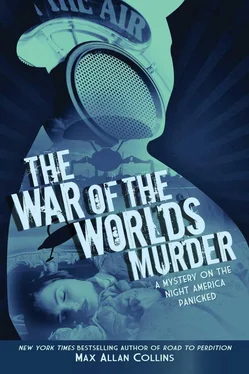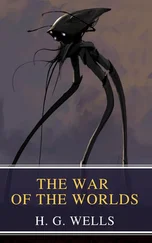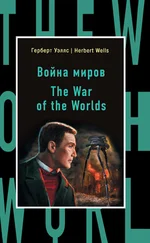Max Collins - The War of the Worlds Murder
Здесь есть возможность читать онлайн «Max Collins - The War of the Worlds Murder» весь текст электронной книги совершенно бесплатно (целиком полную версию без сокращений). В некоторых случаях можно слушать аудио, скачать через торрент в формате fb2 и присутствует краткое содержание. Жанр: Исторический детектив, на английском языке. Описание произведения, (предисловие) а так же отзывы посетителей доступны на портале библиотеки ЛибКат.
- Название:The War of the Worlds Murder
- Автор:
- Жанр:
- Год:неизвестен
- ISBN:нет данных
- Рейтинг книги:5 / 5. Голосов: 1
-
Избранное:Добавить в избранное
- Отзывы:
-
Ваша оценка:
- 100
- 1
- 2
- 3
- 4
- 5
The War of the Worlds Murder: краткое содержание, описание и аннотация
Предлагаем к чтению аннотацию, описание, краткое содержание или предисловие (зависит от того, что написал сам автор книги «The War of the Worlds Murder»). Если вы не нашли необходимую информацию о книге — напишите в комментариях, мы постараемся отыскать её.
The War of the Worlds Murder — читать онлайн бесплатно полную книгу (весь текст) целиком
Ниже представлен текст книги, разбитый по страницам. Система сохранения места последней прочитанной страницы, позволяет с удобством читать онлайн бесплатно книгу «The War of the Worlds Murder», без необходимости каждый раз заново искать на чём Вы остановились. Поставьте закладку, и сможете в любой момент перейти на страницу, на которой закончили чтение.
Интервал:
Закладка:
He began by chatting with Williams, the security guard, describing Virginia Welles to the man. It turned out Williams knew who Mrs. Welles was but, today or tonight, he hadn’t seen “hide nor hair” of her. Then Gibson passed along a description of Balanchine (courtesy of Houseman), as well.
At the reception desk, Williams shook his head. “I never seen that guy that I know of.”
Then Gibson described, as best he could, the three thugs who had accosted Welles and himself down the street from the Mercury Theatre last night.
But Williams was no help there, either.
“And I’m pretty familiar with everybody who comes in and out of the place,” the guard insisted.
His effort barely begun, Gibson already felt helpless, unsure of what to do next.
“Kind of a dull program tonight,” Williams said.
“Huh?”
The guard nodded over toward a speaker positioned high on the wall, over the doorway to the Studio One hallway; the live broadcast was being piped in-dance music, right now. Gibson, who’d heard the show rehearsed half a dozen times, had been oblivious to it.
“The Mercury show,” Williams was explaining. “Kinda dull-please don’t tell Mr. Welles I said so!”
“I won’t, Mr. Williams. I won’t.”
“About these people?”
“Yes?”
“Why don’t you check with George? He’s on the floor just above us.”
“I’ll do that.”
“And Fred’s down on seventeen-the news bureau?”
“Thanks. Any other security on duty?”
“No, sir. That’s it.”
As Gibson was getting on the elevator, a fake news flash kicked in.
In Studio One, Dan Seymour had just reported a request from the Government Meteorological Bureau that the nation’s observatories keep a watch on “any further disturbances” on Mars. Shortly, listeners would be taken to the Princeton Observatory in New Jersey where “noted astronomer” Professor Pierson would give an expert assessment of the situation.
“We return you until then,” the announcer said, “to the music of Ramon Raquello and his orchestra….”
In Lambertville, New Jersey, Miss Jane Dorn, 57, and her sister Miss Eleanor Dorn, 54, returned from an evening church service to their small house, inherited by them jointly from their minister father, a Baptist.
The two women had never worked for a living, sharing a modest but secure income from investments their late father had made during a lifetime of service and sacrifice. Both were chiefly interested in their Bible studies and baking pies for themselves and church bake sales; neither had ever had a serious beau-they had also inherited their father’s looks, which is to say, hawkish, pinched countenances, poor eyesight necessitating thick-lensed glasses, and odd lanky yet thick-hipped frames.
In small-town America of the thirties, the Dorn sisters of Lambertville were considered “old maids,” a term not terribly pejorative then; but the sisters considered themselves godly women doing the Lord’s work-which, again, consisted primarily of Bible studies and pie baking (and eating).
The two had only grammar school educations, but considered themselves serious-minded. They both did a great deal of reading, Miss Jane partial to biographies of great men like Martin Luther and Abraham Lincoln, while Miss Eleanor was a devotee of the Bronte sisters and Jane Austen. When they decided to buy a radio console for their living room, the sisters agreed they would restrict their listening to religious and educational programming, though they had become quietly addicted to radio serials, in particular Mary Noble, Backstage Wife and One Man’s Family . This penchant for soap opera was the closest thing to a vice in the shared life of the sisters.
So it was, when they returned from Sunday evening service, that Miss Jane switched the radio on to an interview-in-progress, with Professor Richard Pierson.
This seemed to fill the educational requirement they still pretended to honor (none of their “stories” were on at the moment), so the sisters settled into twin rockers and began their knitting while, without a word to each other, they both became enthralled with the scientific discourse, which was accompanied by the hypnotically compelling sound of a ticking clock.
The reporter, Carl Phillips, described the scene vividly: Professor Pierson stood on a small platform, peering through a huge microscope in a large semicircular room, “pitch black but for an oblong split in the ceiling.” Through that opening, stars could be seen. Mr. Phillips warned listeners that the interview might be interrupted at any moment, as Professor Pierson was in constant communication with astronomical centers around the world.
“Professor, would you please tell our radio audience exactly what you see as you observe Mars through your telescope?”
“Nothing unusual at the moment, Mr. Phillips. A red disk swimming in a blue sea. Transverse stripes across the disk. Quite distinct now, because Mars happens to be the point nearest the earth…in opposition, as we call it.”
“In your opinion, what do these transverse stripes signify, Professor Pierson?”
“Not canals, I assure you, Mr. Phillips.”
The sisters smiled to themselves as the professor assured the reporter that, despite “popular conjecture,” the possibility of intelligent life on Mars was “a thousand to one.”
Miss Jane said, “God’s in His Heaven.”
Miss Eleanor said, “And all’s right in the world.”
This exchange was a common one between the sisters; but right now, with all this talk of Mars and the heavens, it seemed particularly apt.
Walter Gibson tried George, the security guard on the twenty-first floor.
The heavyset, florid man was leaning back in his swivel chair behind the reception desk asleep and snoring, when Gibson approached and cleared his throat.
George’s eyes popped open and he lurched forward. “Yes! Yes!”
Only the fact that he was investigating a murder kept Gibson from laughing.
He introduced himself and explained to the security guard that he was trying to ascertain whether or not anyone had seen Virginia Welles or George Balanchine around the building today-and if so, when? How recently?
George knew who Mrs. Welles was, but hadn’t seen her; he just shook his head when Gibson shared Balanchine’s description with him. The same response came when Gibson asked about the three thugs from last night.
“Like I say,” George said, “I haven’t seen Mrs. Welles today. I’ve been on this desk since Sadie, the receptionist, left at five P.M. Before that, I was in the security office on the eighteenth. I’ve got Sadie’s phone number-you could call her.”
Gibson took the number, writing it down in the notebook he carried to record plot brainstorms and to write descriptions of people and places he happened upon.
The “War of the Worlds” broadcast was piped in onto this floor, too-right now the two Shadows were in a scene together, Shadow-Number-One Frank Readick playing a reporter asking Shadow-Number-Two Orson Welles various questions about Mars.
“Professor, for the benefit of our listeners, how far is it from Mars to Earth?”
“Approximately forty million miles.”
“Well, that seems a safe enough distance.”
The security guard was shaking his head. “Mr. Gibson, I’m sure I haven’t seen this Balanchine character, or those hoodlum types, neither.”
“Why so sure, George?”
George shrugged. “First of all, I haven’t seen anybody this evening who I don’t recognize as one of the actors or other production personnel, on one show around here or another. And second…” Another shrug. “… I would’ve stopped anybody I didn’t recognize. Mr. Gibson, nothing gets past me.”
Читать дальшеИнтервал:
Закладка:
Похожие книги на «The War of the Worlds Murder»
Представляем Вашему вниманию похожие книги на «The War of the Worlds Murder» списком для выбора. Мы отобрали схожую по названию и смыслу литературу в надежде предоставить читателям больше вариантов отыскать новые, интересные, ещё непрочитанные произведения.
Обсуждение, отзывы о книге «The War of the Worlds Murder» и просто собственные мнения читателей. Оставьте ваши комментарии, напишите, что Вы думаете о произведении, его смысле или главных героях. Укажите что конкретно понравилось, а что нет, и почему Вы так считаете.

![Герберт Уэллс - The War of the Worlds [С англо-русским словарем]](/books/26611/gerbert-uells-the-war-of-the-worlds-s-anglo-thumb.webp)










